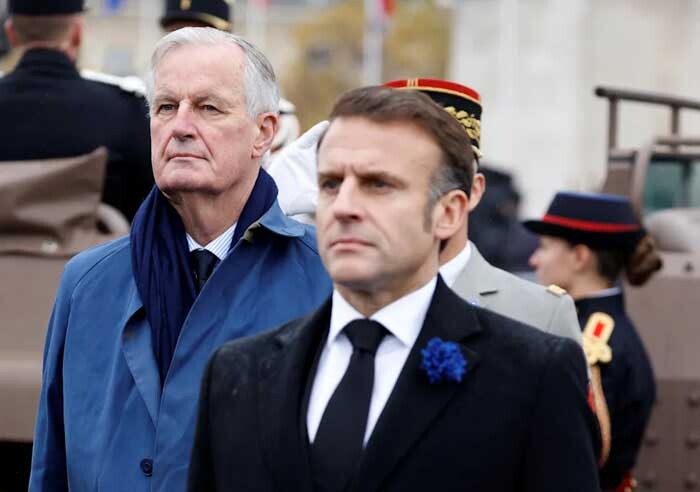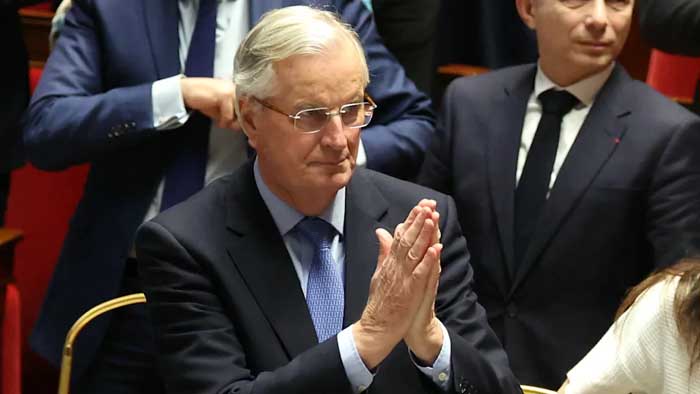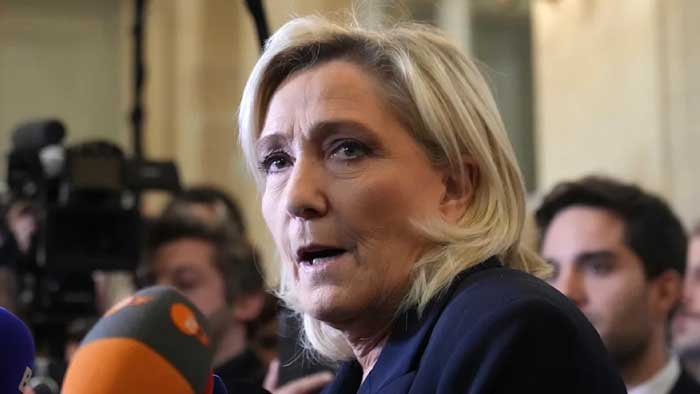
Posted by - News Staff![]() \
\
December 4, 2024 \
Filed in - Breaking News \
France Prime Minister Michel Barnier’s government ousted \
2.4K views \ 0 reviews
DLNews politics:
Paris has erupted in political upheaval, with the French National Assembly delivering a historic vote of no confidence that ousted Prime Minister Michel Barnier’s government. This seismic event was the first topple of a French government since 1962 and came just three months after Barnier took office. In a rare convergence of extremes, Marine Le Pen’s far-right National Rally joined forces with the ultra-left coalition led by Jean-Luc Mélenchon to dethrone Barnier, marking an unprecedented political alliance that has left France reeling.

The moment of fall: Barnier shortly after the results were announced on Wednesday evening.
The turmoil was triggered by Barnier’s attempt to pass an austerity budget using the controversial Article 49.3 of the French Constitution, bypassing parliamentary approval. This maneuver ignited outrage across the political spectrum. The no-confidence motion passed with 331 votes—well above the 288 required—plunging the country into governmental paralysis.

The far-left Popular Front leader Jean-Luc Mélenchon (73, middle) has had the largest faction in the French parliament since his election victory in June but was not appointed prime minister
A Fragmented Political Landscape
The balance of power in France’s National Assembly has become a labyrinthine challenge for governance. Barnier, a conservative-bourgeois leader supported by President Emmanuel Macron, led a precarious minority government. His reliance on conservative backing and abstention from Le Pen’s faction to push through legislation exposed the brittle nature of his coalition.
Marine Le Pen, aiming to position herself for the presidency ahead of a potential conviction for embezzling EU funds, aligned with Mélenchon’s far-left bloc. This unholy alliance underscores the discontent with Macron’s administration and economic policies. Mélenchon, often described as an ultra-left firebrand, seized the moment to amplify chaos, leveraging his disdain for austerity measures and Germany’s financial influence to destabilize Macron’s agenda further.

Marine Le Pen is accused of embezzling EU funds and could be barred from elections.
Ripple Effects Across Europe and the World
France’s political instability poses a grave threat to the European Union’s fragile cohesion. The euro, a cornerstone of European financial stability, could face significant pressure as investors respond to the uncertainty. France’s national debt has ballooned to an alarming €3.2 trillion—112% of its GDP—raising concerns about its ability to manage rising interest rates. Government bond yields are already surpassing those of Greece during the eurozone crisis, signaling potential financial contagion.
European stock markets reacted swiftly, with the CAC 40 dipping 2.3% in early trading, while Germany’s DAX and London’s FTSE showed milder but notable declines. “France’s instability risks reverberating through the entire European economy,” warned European Central Bank President Christine Lagarde. A prolonged crisis in France, the EU’s second-largest economy, could exacerbate inflation and deepen recession fears, especially as the continent grapples with the ongoing energy crisis and fallout from the Ukraine war.
The shockwaves extend beyond Europe. The United States, already navigating heightened economic uncertainty under newly elected President Donald Trump, is watching closely. Trump’s planned visit to Paris for the Notre Dame reopening now carries additional diplomatic weight. “France’s troubles underscore the need for strong leadership in an increasingly unstable world,” Trump remarked en route to Paris. Wall Street showed minor declines as investors eyed safe-haven assets, wary of further destabilization in Europe.
Global Instability: Ukraine and Israel Conflicts Loom
The chaos in France could not come at a worse time for global stability. As Macron juggles internal strife, he has been largely absent from pivotal international discussions, including efforts to broker peace in Ukraine and the escalating conflict between Israel and Hamas. Macron’s recent proposal for a French-Saudi two-state solution conference is now overshadowed by domestic turmoil, weakening his position as a global mediator.
The Ukraine war continues to strain Europe’s unity, with Russian aggression destabilizing the eastern front. Meanwhile, the Israel-Hamas conflict has polarized international opinion, further testing alliances. Under Trump’s polarizing leadership, the United States will likely face increasing pressure to fill the vacuum left by Macron’s waning influence.
A Crisis of Leadership
Macron, whose term ends in 2027, faces mounting calls to step down. While he has vowed to remain in office, his diminished authority leaves France adrift at a critical juncture. Finding a new prime minister to navigate this political minefield will be an uphill battle. For now, Barnier’s ministers will continue in a caretaker capacity, but they are powerless to propose new legislation, leaving France’s government effectively paralyzed.
The stakes could not be higher as the world watches France’s political drama unfold. With its economic stability, European leadership, and global influence hanging in the balance, France must navigate a path out of this chaos—or risk dragging the world into more profound instability.

Desert Local News is an invitation-only, members-based publication built on fact-checked, non-biased journalism.
All articles are publicly visible and free to read, but participation is reserved for members—comments and discussion require an invitation to join.
We cover local, state, and world news with clarity and context, free from political agendas, outrage, or misinformation.
Comments